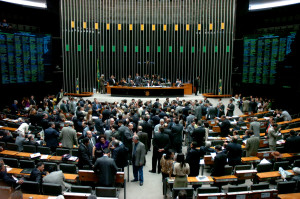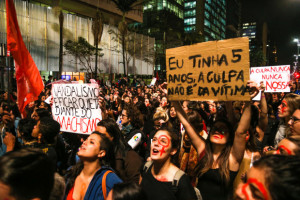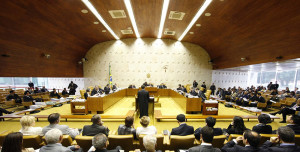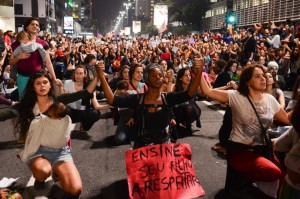By Carla Batista and Sonia Corrêa*
In November 2016, the first bench of the Brazilian Supreme Court, in a judgment of a habeas corpus of health professionals condemned in a criminal abortion case in Rio de Janeiro, accompanied the opinion delivered by Minister Luís Roberto Barroso that up until the 12th week of pregnancy abortion should be decriminalized. In his own words:
“Criminalization is incompatible to the following fundamental rights: the sexual and reproductive rights of women, who cannot be forced by the state to take to term an unwanted pregnancy; the autonomy of women who have the right to make their own existential choices; the physical and mental integrity of women who experience in their body and psychic life the effects of pregnancy; the equality of women, as given that men cannot get pregnant – full gender equality rests on the respect for women’s will in respect to this matter. Furthermore, the impact of criminalization on poor women must be also considered. The treatment of this crime by the Brazilian criminal law creates obstacles for these women, who do not have access to private physicians and clinics, nor enables them to recurring to the public health system in order to submit to proper procedures. As a consequence, a growing incidence of self mutilation, serious injuries and deaths is registered.” [1].
The decision was a strong sign that the Supreme Court has a democratic understanding of abortion as a human rights, public health and social justice problem. Albeit in a different language, this understanding converges with the views of a significant part of the Brazilian society. In February 2017, the organization Catholics for the Right to Decide published the results of an opinion poll[2] performed in partnership with a main Brazilian polling institute (IBOPE) whose results revealed that 64 percent of persons interviewed either totally or partially disagree with the arrest and imprisonment of women who resort to illegal abortion.
Since 2016, two lawsuits calling for the decriminalization of abortion have been presented to the Supreme Court. In August 2016, the Direct Action of Unconstitutionality No. 5,581 was tabled by the National Association of Public Defenders (ANADEP). It interrogates the limits of the Brazilian State response to the Zika epidemics. Among other requests, it demands that pregnant women infected by Zika — who are mentallly suffering with this circumstance — should have the right to interrupt the pregnancy in order to protect their health.
Then, on March 2017, a Claim of Non-Compliance with Fundamental Principles (ADPF) No. 442 was tabled by Socialism and Freedom Party (PSOL). This new petition argues that the current punitive legislation on abortion violates the premises enshrined in the Brazilian Federal Constitution in what concerns the fundamental principles of human dignity, citizenship and non-discrimination, fundamental rights to inviolability of life, freedom, equality, health and family planning. It also argues that criminalization of abortion also infringes the prohibition of torture and inhumane/ degrading treatment. Having these arguments ate the backdrop, it calls the Supreme Court to decriminalize abortion and it includes an injuction (pedido liminar) requesting that criminalization is suspended meanwhile the case is judged. Since it has been tabled, the Executive branch and the Congress have expressed views that are in disagreement with the subtance of the petition. The timing of the Court proceeding to the lawsuit is not yet clear, but a series of Amicus Curiae, both contrary and in favor of the petition, have already been presented.
 These Court debates on criminalization of abortion have triggered inevitable reactions on the part of the anti-abortion rights camp. As reported by SPW, in November 2016, Parliamentarian voices openly contested the Minister Barroso opinion. Then when the new legislature began in February 2017 regressive provisions pending of decision at Congress whose processing – which had slowed down since late 2015– were once again pushed forward. The list potentially retrogressive laws in relation to abortion includes two provisions have been dragging in the House for many years and four proposals of constitutional amendment, as follows:
These Court debates on criminalization of abortion have triggered inevitable reactions on the part of the anti-abortion rights camp. As reported by SPW, in November 2016, Parliamentarian voices openly contested the Minister Barroso opinion. Then when the new legislature began in February 2017 regressive provisions pending of decision at Congress whose processing – which had slowed down since late 2015– were once again pushed forward. The list potentially retrogressive laws in relation to abortion includes two provisions have been dragging in the House for many years and four proposals of constitutional amendment, as follows:
PL 478– Authored by former congressmen Luis Assume and Miguel Martini (PHS/MG) was originally tabled in 2007. It is known as the “Statute of the Unborn”. Grounded on the principle of “right to life from conception”, it defines abortion as hideous crime and grants a series of rights to the embryo. A conservative rapporteur at the Committee on Constitution and Justice of House is revising the provision.
PL 5069 – This provision aims at restricting the access to abortion in the case of rape. It was also tabled by the ex MP Eduardo Cunha, in 2013 in response to a legislation then approved to regulate access to legal abortion in the public health system. In October 2015, when the rapporteur at the Commission on Constitution and Justice approved its content, feminist street protests [http://sxpolitics.org/brazil-feminists-take-the-streets-against-cunha-and-bill-50692013/13573] mushroomed across the country.
Constitutional Amendment Proposal PEC 164/2012 (drafted in 2012 and re-tabled in early 2015) –The proposal was authored by MP Eduardo Cunha [http://www.bbc.com/news/world-latin-america-39442005] president of House until 2016, who is now arrested for corruption. It aims at altering Article No5 of the Federal Constitution to ensure the “inviolability of the right to life from conception”. After Cunha’s arrest it will hardly prosper.
Constitutional Amendment Proposal PEC 29/ 2015 – It was presented by senator Mango Malta, who is an Evangelical pastor, in early 2015. It also proposes Article No5 of the Federal Constitution to be altered as to ensure the inviolability of the right to life from conception. Differently from PEC 164, its processing has moved forward. In June 2017, its rapporteur has released the text for final voting. By then the proposal had gathered the support of 28 senators, including one women and a representative of the Workers Party (PT). Today PEC 29 constitutes the main threat for abortion rights in Brazil, as if approved it will strike down the three legal exceptions allowing for abortion in Brazilian law: woman’s life risk, rape and anencephaly.
Since 2011, two other proposals of constitutional amendments originally unrelated to abortion have been inserted with language on the right of the fetus: PEC 58 (2011) and PEC 181 (2015). In these two cases, the anti abortion camp is using constitutional amendments aimed expanding the benefits of maternity leave to abortion rights. The two amendments are politically very risky because they are being discussed in a Special Commission dominated by conservative forces. In the last week of August, the rapporteur of PEC 181 delivered it for final voting by the commission, mobilizing a national feminist alert.
Conservative moves in relation to abortion have also been registered at other legislative levels. For example, a already reported by SPW, the Federal District Assembly (Brasília) approved a law provision determining that women who seek legal abortion in the case of rape should be shown images of living fetuses as a ‘pedagogical measure to deter them from the decision to abortion’ (in Portuguese). Feminist organizations immediately launched an online campaign against the law. As soon as it was aired, the Governor of Brasilia declared that he would veto the law, but his announced decision has not yet been implemented.
When the first version of this article was published in early August, Evangelical sources announced that the House anti-abortion group would vote in block against the investigation of president Temer for passive corruption, in case he commitment full support to he so called ‘statute of the unborn’ (PL 478/2007). As it is well known the House has not authorized the investigation and the assessments made by feminists is that having once again ensured its hegemony the conservative group in power at the Congress would begin rapidly propelling the various anti-abortion bills pending of final decision. The movement observed in relation to PEC 181 suggests that this may be indeed the case.

Brazilian feminist movements are constantly mobilizing against the approval of these regressive draft bills. However in these troubled times there is much more to be tackled and therefore feminists voices are also raising against other constitutional changes and related measures that aime at restricting labor and social security, imposing drastic budget cuts and threatenning land rights of indigenous and afro—Brazilian people. If feminist organizations and movements are doing their best to contain these legislative rgressions and support the call for decriminalization presented to the Supreme Court (ADPF 442), they do know that struggling for abortion rights must be squarely placed within the wider frame of broader human rights and social justice.
* A first version of this article written by Carla Batista was published at the web magazine Carta Capital, on August 9th, 2017.
Carla Gisele Batista is an educator and researcher, has masters in Women, Gender and Feminism Studies at the Federal University of Bahia and is an activist for the Articulation of Brazilian Women.
Sonia Corrêa is SPW co-chair
[1] Access to the document in Portuguese here.
[2] Access to article on the opinion poll in Portuguese here.


